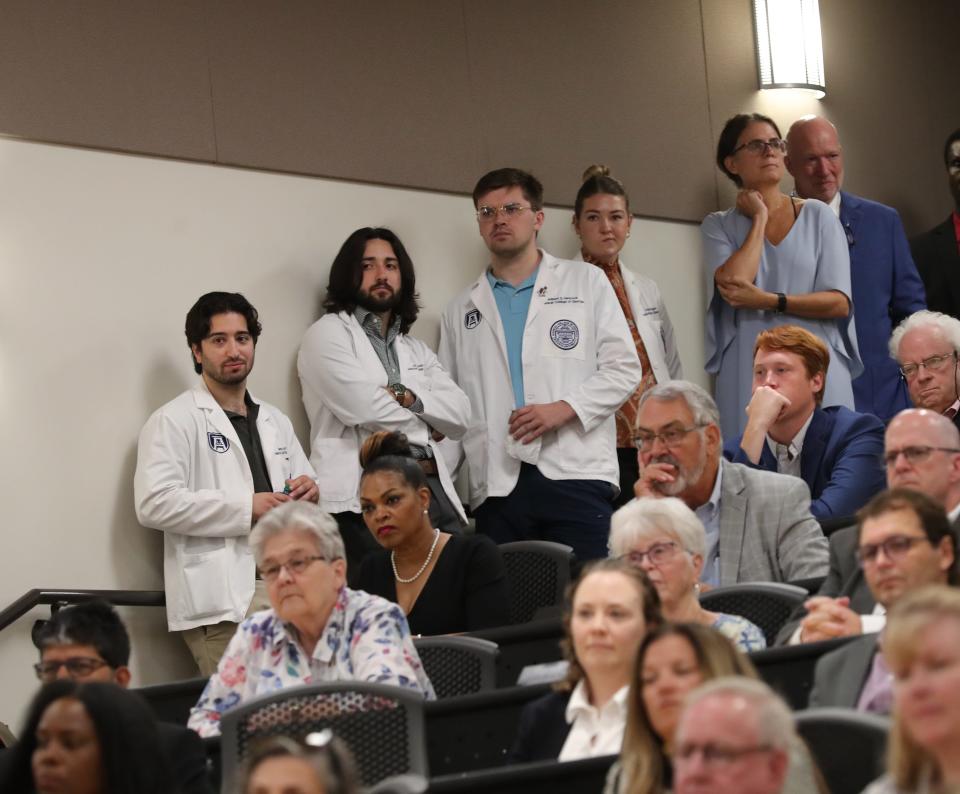Savannah has a new four-year medical school with a 160-student capacity (40 students per class level).
The Medical College of Georgia (MCG), based in Augusta, has opened a Savannah campus in partnership with another University System of Georgia (USG) institution, Georgia Southern University (GSU). The Armstrong Campus, 11935 Abercorn St., will serve as the physical home of MCG’s new location, providing 23,000 square feet of instructional space and 13,000 square feet of a shared anatomy lab as well as access to a simulation lab all within the GSU Armstrong Center and Waters College of Health Professionals, according to GSU President Kyle Marrero.
St. Joseph’s/Candler serves as the local medical partner providing clinical opportunities for students, continuing its relationship with MCG that began with clinical offerings to students in 2007. The partnership expanded in 2011 when the college opened its two-year regional clinical campus within St. Joseph’s/Candler’s medical facilities.
The expansion of MCG, which also has campuses in Albany, Athens and Rome, means it is now one of the top five medical schools by class size in the United States. “Fourth or fifth,” said MCG Dean Dr. David Hesse, who led remarks Friday morning ahead of the ribbon cutting for the officially named “Medical College of Georgia – Savannah at Georgia Southern University.”
The main aim of the school is to produce more physicians for Savannah and throughout Georgia to address the ongoing healthcare workforce shortage, which Hesse said has Georgia 40th in the nation related to healthcare positions per capita.
A Georgia Healthcare Workforce Commission Executive Summary from 2022 stated that three main factors for the shortage were “overall population growth, an aging population, and increasing disease burden [such as more incidences of obesity, diabetes, kidney diseases and other ailments] among Georgians.”
Dean name for MCG Savannah: Medical College of Georgia selects founding dean as Savannah program prepares to expand
‘Anatomy of this partnership’
Hesse served as an emcee of sorts for a plethora of speakers at Friday’s ribbon cutting. Many of the speakers, from USG Chancellor Sonny Perdue to Georgia Speaker of the House Jon Burns, touted the spirit of collaboration among elected officials (locally and across the state) as well as university leaders and public partners.
Don Waters, local philanthropist and former Board of Regents member representing Georgia’s First District, received many verbal nods from the six speakers, which also included Marrero, Augusta University President Russel Keen, and President and CEO of St. Joseph’s/Candler, Paul P. Hinchey.
Absent from the speakers list, though she did receive a round of boisterous cheers from the medical students in the audience, was Dr. Elizabeth Gray, dean of the MCG Savannah campus. Gray has been instrumental not only in fortifying MCG’s relationship with GSU and St. Joseph’s/Candler, but also in bringing the four-year program online in just over a year. Hesse said of her, “She does all the work.” Whenever he asked her if she could meet a goal, she always said yes and delivered rapidly.
Though she has been effective, Hinchey pointed out, “Like many overnight successes the anatomy of this partnership has taken years.” Hinchey also mentioned that the faculty (with whom Gray had already established an outstanding reputation) for the 80 third- and fourth-year students are all volunteer faculty.
Keen noted in an interview with Savannah Morning News on Thursday that more than 1,000 of MCG’s faculty across all its campuses are volunteers. He said many of them are MCG alumni who choose to give back, “not because of anything other than the love for the profession.” He said some faculty have shared that they also benefit from the new techniques and research the students bring with them.
Another reason medical clinicians might want to provide volunteer services is thanks to the Georgia Preceptor Tax Incentive Program, which allows physicians who provide “uncompensated training” up to $8,500 in tax credits each calendar year.
St. Joseph’s/Candler growth: St. Joseph’s/Candler expanding westward to reach communities amid growth

Local impact
Money, as it does, seems to have factored into this collaboration, as well.
Perdue cited, as a “fiscal conservative” that he was happy the GSU facilities could meet the physical space needs of the college. “It helped us get this deal very inexpensively,” he said.
Other speakers floated the term “economic development.” Hesse said bringing a doctor to an area adds about $2 million a year to the local economy through disease prevention, hiring of staff, and paying taxes.
Hinchey said the St. Joseph’s/Candler Board believes that health care needs to be “a willing partner in economic development” especially as the community grows. He framed the ribbon cutting as a celebration of an effective public-private partnership among “three public tier-one academic institutions and a private, locally owned and locally governed health system working together to expand health access, with a community vision, educating Georgia and working in Georgia.”
Hesse said, “There’s a basic maxim in medicine: Where you train is where you’re going to practice.” Keen reiterated that point during an interview, saying MCG beats the national average of graduating medical students remaining in state to practice.
“We fully anticipate that you’re going to see a lot more physicians and other healthcare professionals stay in Georgia but more specifically in this area,” Keen said.
Joseph Schwartzburt is the education and workforce development reporter for the Savannah Morning News. You can reach him at [email protected].
This article originally appeared on Savannah Morning News: MCG’s Savannah expansion puts it in top 5 largest US medical colleges
Source Agencies


